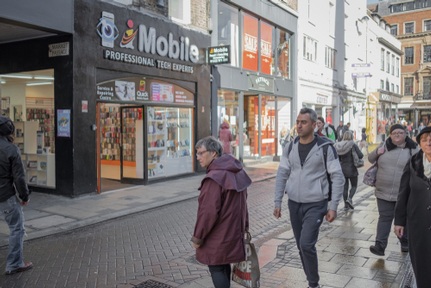High Street and society can't afford to ignore over-65s grey pound or working potential
Ageism is hurting the High Street and society as a whole will suffer, unless ‘more inclusive’ environments and positive attitudes towards ageing are nurtured - that’s the warning from the Future of Ageing Conference.

Hosted by International Longevity Centre (ILC), a think tank which has published new research into older people, the event highlighted how people aged 65+ are being neglected at a time when society should take advantage of their spending, earning and working potential.
Over 65s driving growth in spending
Those aged 65 +are driving growth in spending - with the total spending for households aged 65+ having risen by 75 per cent from 2001 to 2018. By 2040, people aged 50+ could spend more than younger consumers for all sectors.
The figures were published in the ILC’s new report ‘Maximising the longevity dividend’, which also found that regardless of people’s income, there were ‘substantial drops in older people’s spending after the age of 74'. This was because of poor health and ‘non-inclusive’ goods, services, retail areas and neighbourhoods.
An increasing decline in the number of public toilets also affect the health and wellbeing of older people, conference delegates heard. Issues such as incontinence care were raised and what was described as 'the loo leash', which stopped too many older people and disabled from shopping in the high street.
More inclusive measures such as chairs with back and arm supports, inside shops, can also help older people stop and take a rest and also be able to get back up again.
Dr Jane Barratt at the International Federation on Ageing told the conference audience “the way we think and feel and act” is essential to success of longevity. “I'm talking about prejudice and discrimination.“
The Older People's Commissioner for Wales Helena Herklots said she has three aims: “To end ageism, stop abuse of older people and help everyone age well”.
With ‘slow lane’ checkouts trialed at Sainsbury’s supermarkets, Jeremy Hughes chief executive at Alzheimer’s Society welcomed inclusive approaches. He also said it was important that older people, including those with dementia, didn't feel 'stigmatised' by having to move to a slow lane. Instead they should be allowed to stay where they are at the checkout to get help buying goods, while others in the line moved to alternative queues.
Self-employment rate highest among older people
The ILC report stated there was a ‘need to prepare for a rapidly ageing workforce’.
By 2028, more people aged 60+ will work in part-time roles than in any other age group (except the under 30s).
The ILC report stated how self-employment among people aged over 50, was often a response to a lack of suitable work, due to age discrimination, inflexible hours etc.
While some older people may want a chance to work in later life, Harvard professor David Bloom, from Harvard T.H. Chan School of Public Health said: 'Raising the retirement age does nothing for the economy if people aren't healthy enough and governments don't invest in health."
Ageing no bad thing
The conference also raised the issue of the overall value to society of older people and their contribution to the voluntary sector, childcare for grandchildren etc.
The ILC's report stated: ‘The ageing of our society is often portrayed as a disaster for our economy. But this narrative neglects the potential benefits.’
Dr Jane Barratt at the International Federation on Ageing, added ”The rights of an older person are human rights".
“It takes boldness and courage” but she urged the audience to “be positively disruptive” when talking to a policy maker, academic and anyone else about ageing.
Latest News
 29-Jul-24
Dementia Bus gives carehome.co.uk staff insight into life with dementia
29-Jul-24
Dementia Bus gives carehome.co.uk staff insight into life with dementia
 01-Mar-24
Find out the top care homes in 2024
01-Mar-24
Find out the top care homes in 2024
 21-Mar-23
UK's top care homes in 2023 revealed
21-Mar-23
UK's top care homes in 2023 revealed
 03-Jan-23
carehome.co.uk launches free care helpline
03-Jan-23
carehome.co.uk launches free care helpline
 13-Dec-22
5 mins with Emily Whitehurst, chief operating officer for Constantia Healthcare
13-Dec-22
5 mins with Emily Whitehurst, chief operating officer for Constantia Healthcare